
Key information
UCAS code:
C850
Accreditation:
This course is Accredited
Typical offer:
120–128 UCAS points from 3 A levels or equivalent
Showing content for section Overview
Overview
Enrich the lives of others and start your path towards a career that makes a difference.
On this BSc (Hons) Psychological Sciences dual degree, you’ll develop specialist knowledge and skills in a range of psychological subjects, including social interaction, learning and memory, child development, comparative and evolutionary psychology, clinical and health psychology.
You'll study in Portsmouth and spend a year at Edith Cowan University in Perth, Western Australia, giving you international experience and a global perspective on psychology.
When you graduate, you’ll be in a strong position to continue your training as a psychologist and succeed in many professional specialisms, from health and education to sports and forensics.
Psychology at the University of Portsmouth is ranked 5th of the modern universities for research quality
Research Excellence Framework (REF) 2021
Course highlights
- Benefit from a diverse range of psychology facilities – from observation suites and interview booths to thermal cameras and eye tracking technology
- Have the opportunity to study abroad at Edith Cowan University, boosting your global awareness and chance to work both nationally and internationally
- Customise your final year by choosing modules that lay the groundwork for a professional specialism
- Take part in an optional work placement, enhancing your employability

Accreditation
This degree offers eligibility for Graduate Basis for Chartered Membership (GBC) of the British Psychological Society (BPS), if you graduate with a 2:2 or higher.

What's the difference between BSc Psychology and Psychological Sciences (Dual Degree)?
While both courses study the mind and behaviour, on this BSc (Hons) Psychological Sciences Dual Degree you'll have the guaranteed opportunity to study abroad, expand your horizons and graduate with two degrees.
What is a dual degree?
Learn about our dual degree programmes with Edith Cowan University in Australia.
Chris Chang: We have a strategic partnership with Edith Cowan University in Australia, particularly for students who have not travelled abroad or lived abroad, that gives them the opportunity to experience a dual degree. The design of our programmes means that we have developed the programme from the ground up, which doesn't require you to study that much more time for a degree programme.
Heather Massey: There's lots of reasons why people might want to come and study this dual award course at the University of Portsmouth. Learning in a different environment from different tutors and the facilities that they have at Edith Cowan are absolutely first-class.
Chris Chang: Students have the opportunity to travel for a year and the question that some students will have is "how will I be able to afford this?" Now the UK Government has launched the Turing programme and what this programme does is fund them to do study abroad, internships, placements. It makes it accessible to all students from different groups, whether they are international students or students from the UK.
Dr Sarah Reynolds: Experiencing life in a different country. You would mature and develop your confidence during that time and definitely walk out of the degree, I think standing up a bit taller than if you hadn't.
Chris Chang: Now the benefits of this is that you can actually show to employers that you have two degrees from two different universities in two different countries. Jobs these days have changed quite substantially. Your future job may not be in the UK and employers are looking for the kind of employees that are able to work in different contexts, different cultures be able to work in multidisciplinary and multinational teams.
One of the other benefits of this programme is that you can actually travel around, not just, Australia but around the ASEAN region because from Perth it's a very short flight to Hong Kong; to Singapore; to Malaysia.
Heather Massey: It's an amazing opportunity to learn both from experts in their field, but also learn about how different people in a different culture operate.
Chris Chang: There are inter-semester breaks of two-three months and you should use that opportunity to see the world. The other thing that you have is having studied a year abroad, you will make friends who could in the future be your supporters, be your allies, and be your collaborators of the future.
Dr Leah Fox: Even though they're geographically away. They'll still be able to get access to that same level of support as they were getting in Portsmouth. They'll have access to wellbeing, they'll have access to financial services, they'll have access to personal tutoring.
Chris Chang: These courses that we have delivered so far: Global Sport Management, Cybersecurity, Intelligence and Counter Terrorism, Environmental Science and Management are all in very specialist and niche areas. Means that wherever you end up working or living, you're prepared for it. The demand for these courses are high, so we want highly motivated students who will benefit from this programme and benefit from a year abroad.
Dr Leah Fox: We're looking for an applicant who wants to make a change, who is open minded and prepared to be confronted with a number of challenges. But overall, someone who is curious and wants to learn.
Contact information
Contact AdmissionsEntry requirements
BSc (Hons) Psychological Sciences dual degree entry requirements
Typical offers
- A levels - ABB-BBB
- UCAS points - 120–128 points from 3 A levels or equivalent. (calculate your UCAS points)
- T-levels - Merit
- BTECs (Extended Diplomas) - DDM
- International Baccalaureate - 29-30
You may need to have studied specific subjects – find full entry requirements and other qualifications we accept.
English language requirements
- English Language proficiency at a minimum of IELTS band 6.5 with no component score below 6.0.
See alternative English language qualifications
We also accept other standard English tests and qualifications, as long as they meet the minimum requirements of your course.
If you don't meet the English language requirements yet, you can achieve the level you need by successfully completing a pre-sessional English programme before you start your course.
Typical offers
- A levels - ABB-BBB
- UCAS points - 120–128 points from 3 A levels or equivalent. (calculate your UCAS points)
- T-levels - Merit
- BTECs (Extended Diplomas) - DDM
- International Baccalaureate - 29-30
You may need to have studied specific subjects or GCSEs - see full entry requirements and other qualifications we accept.
English language requirements
- English Language proficiency at a minimum of IELTS band 6.5 with no component score below 6.0.
See alternative English language qualifications
We also accept other standard English tests and qualifications, as long as they meet the minimum requirements of your course.
If you don't meet the English language requirements yet, you can achieve the level you need by successfully completing a pre-sessional English programme before you start your course.
We look at more than just your grades
While we consider your grades when making an offer, we also carefully look at your circumstances and other factors to assess your potential. These include whether you live and work in the region and your personal and family circumstances which we assess using established data.
Facilities and specialist equipment
These are just a few of the facilities you'll use during your psychological sciences degree.
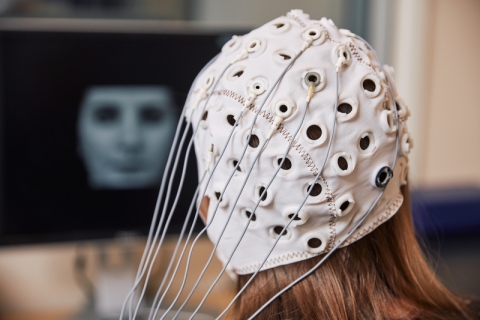
Psychophysiology laboratory
Record and analyse physical responses, such as electrical activity in the brain, neural processes, blood pressure and heart rate, to explore how the body reacts to different psychological states.
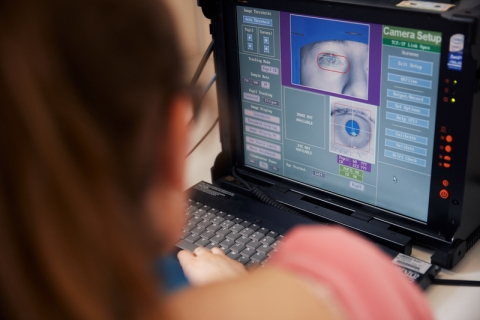
Eye tracking technology
Discover how eye movement can be tracked and analysed to measure spatial attention, and used to study areas such as face recognition and change blindness.
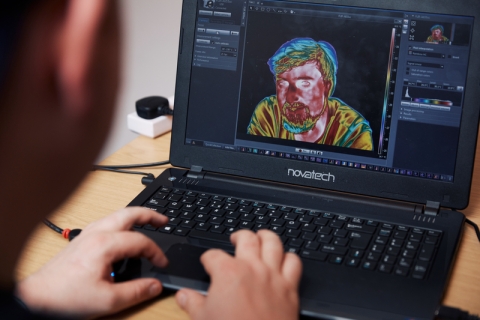
Thermal cameras
Learn how thermal camera technology can be used to read physiological activity in the face and reveal signs of deception.
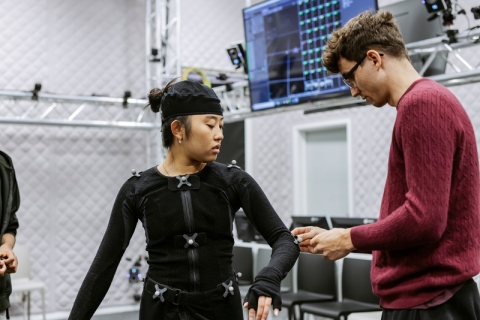
Motion capture laboratory
With our motion capture lab, human movements can be precisely recorded and analysed, providing objective measurements of behaviour.
Careers and opportunities
Once you graduate from your BSc (Hons) Psychological Sciences degree, you’ll have taken your first step towards becoming a Chartered Psychologist (CPsychol), readying you to continue your training.
By choosing specialist subjects in your final year, you'll have gained the skills and knowledge to start specialising in fields such as sport psychology, neuroscience, organisational psychology, forensic psychology, educational psychology, and clinical and health psychology. To continue your Chartered Psychologist training, you'll need a Master's degree in your chosen specialty, this could include MSc Forensic Psychology, MSc Health Psychology, or MSc Sport and Exercise Psychology.
With more than 750,000 people in the UK working in areas that involve psychology (British Psychological Society), you'll also have the opportunity to take on a wide range of roles outside being a Chartered Psychologist. This could include human resources, police work, social welfare, marketing and more.
What can you do with a psychology degree?
As a Chartered Psychologist, areas you could specialise in include:
- sport psychology
- neuroscience
- organisational psychology
- forensic psychology
- educational psychology
- clinical and health psychology
The transferable skills you'll learn are also in demand in other fields, such as:
- teaching (with additional training)
- social welfare
- police work
- research
- marketing
- data engineering
- human resources
Graduate roles and destinations
Graduates of this course could go on to work in roles such as:
- assistant psychologist
- assistant to clinical psychologist
- lecturer in policing
- domestic abuse worker
- wellbeing lead
- occupational therapy support officer
- head of learning and professional development
- assistant to educational psychologist
- recruitment consultant
- HR business developer
- social media campaign manager
- client and service users survey officer
- research engineer (literature reviews and reporting)
- befriender for charities

Ongoing career support – up to 5 years after you graduate
Get experience while you study, with support to find part-time jobs, volunteering opportunities, and work experience.
Towards the end of your degree and for up to five years after graduation, you’ll receive one-to-one support from our Graduate Recruitment Consultancy to help you find your perfect role.
Placements
You'll have the opportunity to boost your career prospects by taking an optional work placement module either in your second or fourth year.
In addition to boosting your employability, placements allow you to gain real-world work experience, which can help you better understand your chosen field and put your skills into practice.
No matter what placement option you choose, your tutor and the team of Science and Health Careers advisors will help you find a work placement and develop your employability. You'll receive a database of placement vacancies from them and they'll continuously advertise open positions in professional areas related to psychology or involving psychology in the workplace.
Potential placement destinations
Students on this course could go on to complete placements in organisations such as:
- Great Ormond Street Hospital
- Infant and Junior Schools
- Mind mental health charity
- Stop Domestic Abuse charity
- Portsmouth City Council
- Solent NHS Trust
- GlaxoSmithKline
- Microsoft technology corporation
- IBM
Modules
Each module on this course is worth a certain number of credits.
In each year, you need to study modules worth a total of 120 credits. For example, four modules worth 20 credits and one module worth 40 credits.
Your locations
In Years 1, 2 and 4, you'll be studying at the University of Portsmouth.
In Year 3, you'll be studying at Edith Cowan University in Perth, Australia.
What you'll study
Core modules
All modules in this year are core.
Core modules
All modules in this year are core.
The following modules are taught at the partner institution Edith Cowan University.
Optional modules include:
- Aboriginal Australians in the Criminal Justice System – 15 credits
- Advanced Methods of Psychological Inquiry – 15 credits
- Applications of Psychological Literacy – 15 credits
- Culture and Diversity in Therapeutic Practice – 15 credits
- Mental Health and Psychological Interventions – 15 credits
- Principles of Youth Work – 15 credits
- Social Work and Mental Health – 15 credits
- Strategies for Social Change – 15 credits
- Vulnerable People and Communities – 15 credits
- Working With Groups – 15 credits
All modules in this year are optional.
Optional modules
All modules in this year are optional.
Particular emphasis will be given to effect sizes and confidence intervals. At a practical level, the module will develop advanced statistical analysis skills using appropriate computer packages and support you to develop your skills in both reporting and interpreting statistical results.
You’ll get familiar with the big issues and contemporary debates in education studies as well as the role and expectations of a teacher.
You’ll develops fundamental knowledge and skills that teachers require, as well as your capability to structure and critique a lesson plan.
Explore the major theoretical frameworks and research methodologies used, focusing on how forensic psychology has been informed by this across different subfields in psychology.
Develop analytical skills by combining literature across different subfields within forensic psychology.
Finish with enhanced knowledge on the contribution of forensic psychology to real world practice.
Specifically, taught content will explore essential psychological constructs relevant in sport and exercise psychology. The module will encourage you to critically discuss and report on the key social and development topics encountered by practitioners when working in sport and exercise. You'll also develop a critical awareness of a range of psychological strategies (and the underpinning theory and research) that can be employed to improve athlete, team, and coach performance. This module will provide an understanding of sport psychology application and professional practice. Specifically, taught content will explore the role of the sport psychology practitioner, models of practice, and the philosophical, ethical, and how psychological constructs work in sport and exercise psychology settings. The module will introduce you to conducting and interpreting sport psychology initial assessments with athletes, teams and coaches.
You'll be required to draw upon appropriate research methods to gather data that addresses a specific research question or psychological issue. The rationale for the study, the adopted research methodology and the findings are presented in an extended report. Your proposed research must undergo a formal ethical review process before project work may begin. You'll be allocated to a project supervisor, prior to the start of Level 6, who will support you via regular meetings during the project. The module also contains an integrated personal tutorial system.
You'll be required to draw upon appropriate research methods to gather data that addresses a specific research question or psychological issue. The rationale for the study, the adopted research methodology and the findings are presented in an extended report. You'll also present a verbal justification for your study and the approach adopted in the form of a project interview assessment. Your proposed research must undergo a formal ethical review process before project work may begin. You'll be allocated to a project supervisor, prior to the start of Level 6, who will support you via regular meetings during the project. The module also contains an integrated personal tutorial system.
Changes to course content
We use the best and most current research and professional practice alongside feedback from our students to make sure course content is relevant to your future career or further studies.
Therefore, some course content may change over time to reflect changes in the discipline or industry. If a module doesn't run, we'll let you know as soon as possible and help you choose an alternative module.
Where you'll study (year 3)
You'll study at Edith Cowan University's Joondalup Campus during your third year and student accommodation is available on the Mount Lawley Campus. Both campuses offer a library, computer labs, cafes, bars, a fitness centre, student support and counselling services.

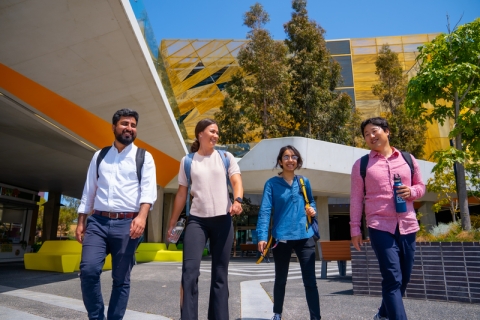

How you're assessed
You’ll be assessed through:
- written examinations
- practical reports and essays
- poster presentations
- oral presentations
- self-led research project
You’ll be able to test your skills and knowledge informally before you do assessments that count towards your final mark.
You can get feedback on all practice and formal assessments so you can improve in the future.
Teaching
Teaching is informed by our internationally recognised research across four key areas. This includes forensic, health, comparative and developmental psychology.
Teaching methods on this course include:
- lectures
- small focussed seminars
- one-to-one tutorials
- practical research
- experiments
You'll also take part in collaborative learning techniques through tutorial exercises that focus on specific issues in psychology and case studies.
You'll have access to all teaching resources and sessions on Moodle, our virtual learning environment, from anywhere with a web connection.
Teaching staff profiles
Many of the teaching staff on this BSc (Hons) Psychological Sciences course are research active with expert knowledge of a variety of areas relevant to psychological science.
These are some of the expert staff who'll teach you on this course:
How you'll spend your time
We recognise that you'll probably be juggling more demands when you do your Master's degree, as you may be working or you may have family responsibilities.
We'll give you as much indication here as we can of how much time you'll need to be on campus and how many hours you can expect to spend in self-directed study, but please note that these indications are always subject to change. You should receive your full timetable several weeks before you start with us.
A typical week
We recommend you spend at least 35 hours a week studying for your dual degree.
In your first year, you'll spend about 10 hours a week in timetabled teaching activities such as tutorials, lectures, seminars and practical classes or workshops. You'll have personal tutorials built into your modules, with weekly meetings in your first year and fortnightly meetings in your second year.
The rest of the time you’ll do independent study such as research, reading, coursework and project work, alone or in a group with others from your course. You'll probably do more independent study and have less scheduled teaching in years 2 and 3, but this depends on which modules you choose.
Most timetabled teaching takes place during the day, Monday to Friday. You may occasionally need to go to University and course events in the evenings and at weekends.
Term times
The academic year at University of Portsmouth runs from September to early June with breaks at Christmas and Easter. It's divided into 2 teaching blocks and 2 assessment periods:
- September to December – teaching block 1
- January – assessment period 1
- January to May – teaching block 2 (includes Easter break)
- May to June – assessment period 2
You'll finish your final year in December.
The academic year at Edith Cowan University runs from February to November with breaks at Easter and in June. It's divided into 2 semesters and 2 exam periods:
- February to May – semester 1 (includes Easter break)
- June – exam period 1
- July to October – semester 2
- November – exam period 2
You'll start year 3 at ECU in semester 2 in July, finishing in semester 1 in May.
Supporting you
The amount of timetabled teaching you'll get on your degree might be less than what you're used to at school or college, but you'll also get support via video, phone and face-to-face from teaching and support staff to enhance your learning experience and help you succeed. You can build your personalised network of support from the following people and services:
Types of support
Your personal tutor helps you make the transition to independent study and gives you academic and personal support throughout your time at university.
As well as regular scheduled meetings with your personal tutor, they're also available at set times during the week if you want to chat with them about anything that can't wait until your next meeting.
You'll have help from a team of faculty learning support tutors. They can help you improve and develop your academic skills and support you in any area of your study.
They can help with:
- improving your academic writing (for example, essays, reports, dissertations)
- understanding and using assignment feedback
- managing your time and workload
- revision and exam techniques
As well as support from faculty staff and your personal tutor, you can use the University's Academic Skills Unit (ASK).
ASK provides one-to-one support in areas such as:
- Academic writing
- Note taking
- Time management
- Critical thinking
- Presentation skills
- Referencing
- Working in groups
- Revision, memory and exam techniques
If you have a disability or need extra support, the Additional Support and Disability Centre (ASDAC) will give you help, support and advice.
All our labs and practical spaces are staffed by qualified laboratory support staff. They’ll support you in scheduled lab sessions and can give you one-to-one help when you do practical research projects.
You can also receive support and training from our departmental technical team to use specialist psychology equipment and facilities.
Our online Learning Well mini-course will help you plan for managing the challenges of learning and student life, so you can fulfil your potential and have a great student experience.
You can get personal, emotional and mental health support from our Student Wellbeing Service, in person and online. This includes 1–2–1 support as well as courses and workshops that help you better manage stress, anxiety or depression.
If you require extra support because of a disability or additional learning need our specialist team can help you.
They'll help you to
- discuss and agree on reasonable adjustments
- liaise with other University services and facilities, such as the library
- access specialist study skills and strategies tutors, and assistive technology tutors, on a 1-to-1 basis or in groups
- liaise with external services
Library staff are available in person or by email, phone, or online chat to help you make the most of the University’s library resources. You can also request one-to-one appointments and get support from a librarian who specialises in your subject area.
The library is open 24 hours a day, every day, in term time.
If English isn't your first language, you can do one of our English language courses to improve your written and spoken English language skills before starting your degree. Once you're here, you can take part in our free In-Sessional English (ISE) programme to improve your English further.
The Maths Café offers advice and assistance with mathematical skills in a friendly, informal environment. You can come to our daily drop-in sessions, develop your maths skills at a workshop or use our online resources.
During your time at Edith Cowan University (ECU), you'll be assigned an academic contact who, alongside module coordinators, will provide pastoral and academic support throughout your study overseas.
You'll also have ongoing support from your course leader, personal tutor and the Global team at University of Portsmouth.
During your final year project, you'll have access to the departmental StatHelp team’s support for statistical analyses.
Course costs and funding
Tuition fees
Fees may be subject to annual increase
UK/Channel Islands and Isle of Man students
- Years 1, 2 and 4 – £9,250 a year
- Year 3 – £1,385
EU students
- Years 1, 2 and 4 – £9,250 a year
- Year 3 – £1,385
Includes Transition Scholarship.
International students
- Year 1, 2 and 4 – £19,200 a year
- Year 3 – £2,000
UK/Channel Islands and Isle of Man students
- Years 1, 2 and 4 – £9,250 a year
- Year 3 – £1,385
EU students
- Years 1, 2 and 4 – £9,250 a year
- Year 3 – £1,385
Includes Transition Scholarship.
International students
- Year 1, 2 and 4 – £19,200 a year
- Year 3 – £2,000
Funding your studies
Find out how to fund your studies, including the scholarships and bursaries you could get. You can also find more about tuition fees and living costs, including what your tuition fees cover.
Applying from outside the UK? Find out about funding options for international students.
Additional course costs
These course-related costs aren’t included in the tuition fees. So you’ll need to budget for them when you plan your spending.
Additional costs
Our accommodation section shows your accommodation options and highlights how much it costs to live in Portsmouth.
You’ll study up to 6 modules a year. You may have to read several recommended books or textbooks for each module.
You can borrow most of these from the Library. If you buy these, they may cost up to £60 each.
We recommend that you budget £75 a year for photocopying, memory sticks, DVDs and CDs, printing charges, binding and specialist printing.
If your final year includes a major project, there could be cost for transport or accommodation related to your research activities. The amount will depend on the project you choose.
You'll need to cover your living costs and pay additional costs of £3,000–£4,000 to cover travel to and from Australia in year 3. You can cover these costs using a UK Government student loan.
We can advise you on travel arrangements, visas, finding accommodation and accessing a student loan that can help pay for your study and living costs when you're in Australia.
Apply
How to apply
To start this course in 2024, apply through UCAS. You'll need:
- the UCAS course code – C850
- our institution code – P80
If you'd prefer to apply directly, use our online application form.
You can also sign up to an Open Day to:
- Tour our campus, facilities and halls of residence
- Speak with lecturers and chat with our students
- Get information about where to live, how to fund your studies and which clubs and societies to join
If you're new to the application process, read our guide on applying for an undergraduate course.
To start this course in 2025, apply through UCAS. You'll need:
- the UCAS course code – C850
- our institution code – P80
If you'd prefer to apply directly, use our online application form.
You can also sign up to an Open Day to:
- Tour our campus, facilities and halls of residence
- Speak with lecturers and chat with our students
- Get information about where to live, how to fund your studies and which clubs and societies to join
If you're new to the application process, read our guide on applying for an undergraduate course.
Admissions terms and conditions
When you accept an offer to study at the University of Portsmouth, you also agree to abide by our Student Contract (which includes the University's relevant policies, rules and regulations). You should read and consider these before you apply.
Applying from outside the UK
As an international student you'll apply using the same process as UK students, but you’ll need to consider a few extra things.
You can get an agent to help with your application. Check your country page for details of agents in your region.
Find out what additional information you need in our international students section.
If you don't meet the English language requirements for this course yet, you can achieve the level you need by successfully completing a pre-sessional English programme before you start your course.

